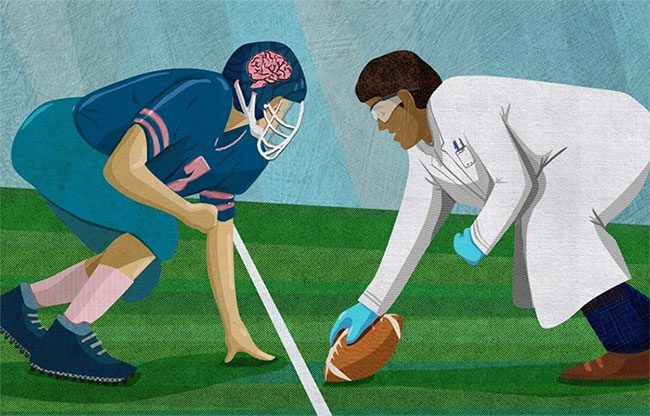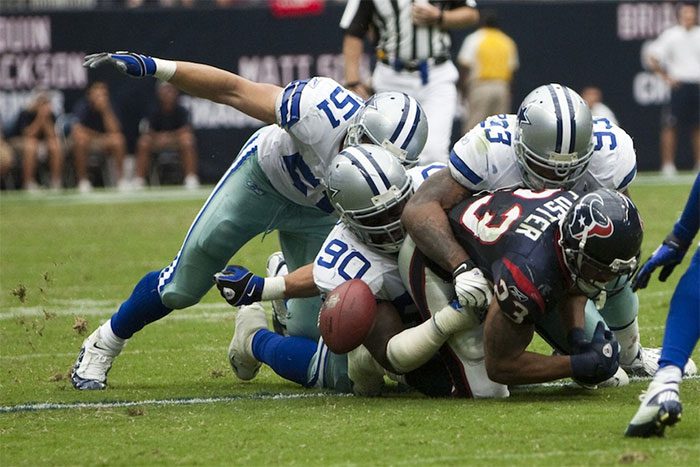According to research, professional athletes are at an increased risk of developing age-related diseases such as dementia, memory loss, and arthritis at an earlier age.
In recent years, sports involving balls (such as soccer and rugby) have come under scrutiny for their dangers, particularly the risk of head injuries.
Chronic Traumatic Encephalopathy (CTE) has devastated the lives of many former athletes, leading many parents to prohibit their children from participating in sports. Some players have even had to abandon the sport altogether.
Recently, a new study from Harvard University reported that former professional athletes, particularly those in offensive positions, are more likely to develop diseases typically found in older adults, even though they are still relatively young. The findings were published in the British Journal of Sports Medicine.
A team of investigators from the Harvard T.H. Chan School of Public Health and Harvard Medical School conducted a survey of nearly 3,000 former players from the National Football League (NFL).
This survey is part of the Football Player Health Study conducted at Harvard University, which includes various studies monitoring the health of players throughout their lifetimes.

In the recent study, players reported to healthcare staff that they often feel older than they actually are. (Photo: Adobe).
Contradictions in Research
Previous studies have shown that former professional athletes not only live longer but their lifespan exceeds that of men with similar demographics. However, this conclusion contrasts with the findings from the new study.
In the recent study, players self-reported to healthcare staff that they often feel older than their actual age. Furthermore, sports medicine doctors treated players for conditions like dementia, arthritis, hypertension, and diabetes, which are typically age-related diseases.
With these conflicting results, the research team surveyed 2,864 former professional athletes, both Black and White, aged 25-59. They examined whether players had ever been diagnosed with age-related diseases.
The research team also used data to measure the length of time players lived without developing any conditions. They compared their results with the general population using data from thousands of non-athlete men aged 25-59.
The researchers discovered that the incidence of all conditions increased with age in both players and the general population, but they noted different rates of disease between the groups.
Former athletes are more likely to be diagnosed with dementia and Alzheimer’s disease in each decade, while younger individuals aged 25-29 are more commonly diagnosed with hypertension and diabetes.

Professional athletes may live as long as men in the general population, but they may suffer from numerous ailments. (Photo: Interexchange).
Football Accelerates Aging in Athletes
“Our analysis raises essential biological and physiological questions about the underlying causes, which are equally important. The results serve as a wake-up call for clinicians to pay closer attention even to relatively young former athletes,” said Rachel Grashow, a senior investigator in the study and director of the epidemiology research initiative.
According to Grashow, such heightened vigilance could facilitate earlier diagnosis and timely intervention to prevent or slow the progression of age-related diseases.
The research team then sought to identify why this sport plays a significant role in disease progression. To do this, they divided the players into two groups: those in offensive positions and those in other positions.
“We wanted to know whether professional athletes are robbed of their middle age. The results indicate that football changes them early on and places them on an alternative aging trajectory, increasing their likelihood of developing many adult diseases,” Grashow stated.
The research team was not only concerned with longevity but also the quality of life. Professional athletes may live as long as men in the general population, but those years may be plagued by various illnesses.
After analyzing the results, they found that players in offensive positions had more exposure to other players and had significantly shorter lifespans across all decades. Additionally, they developed age-related conditions earlier.
Grashow and her team agreed that more research is needed in the future on this issue, and their study will focus on the biological mechanisms related to early aging in athletes.



















































